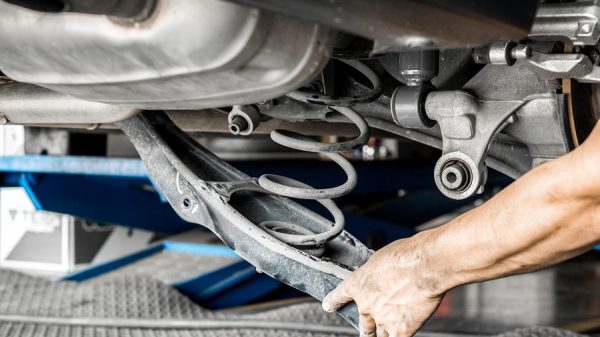The suspension system in your vehicle plays a pivotal role in delivering a smooth and comfortable ride while navigating various road conditions. When this system encounters issues, it can compromise your car’s handling, performance, and overall experience. Understanding the potential costs associated with suspension repairs is paramount for informed decision-making. This comprehensive guide will delve into the factors that influence the cost of fixing a suspension, empowering you to budget effectively and maintain an optimal driving experience.

Image: www.cashcarsbuyer.com
Key Factors Determining Suspension Repair Costs
1. Type of Suspension System:
The design and complexity of the suspension system have a significant impact on repair costs. Vehicles with sophisticated multi-link or independent suspensions tend to be more expensive to repair than those with simpler designs, such as solid axles or leaf springs.
2. Extent of Damage:
The extent of damage to the suspension components directly influences repair costs. Minor repairs may involve replacing worn bushings or shock absorbers, while major repairs could require extensive work, including replacing control arms, ball joints, or springs.
3. Labor Costs:
Suspension repairs usually involve specialized labor, and labor rates can vary widely depending on the location, skill level of the mechanic, and complexity of the repair. Higher labor rates in urban areas or by specialized mechanics can increase the overall cost.
4. Parts Costs:
The cost of replacement parts is a significant factor in determining repair costs. Original equipment manufacturer (OEM) parts tend to be more expensive than aftermarket parts, but they often offer better quality and craftsmanship. The number and types of parts required for the repair will also impact the total cost.
5. Alignment and Balancing:
After suspension repairs, it’s often necessary to perform wheel alignment and tire balancing. These services ensure that your vehicle’s wheels are properly aligned and that tires wear evenly, providing optimal performance and safety. Alignment and balancing costs typically range from $50 to $200 per axle.
Average Suspension Repair Costs
Minor Repairs: $200-$500
Moderate Repairs: $500-$1,500
Major Repairs: $1,500-$3,000
It’s important to note that these are general estimates and the actual cost may vary depending on the factors discussed above. Always consult with a reputable mechanic for an accurate assessment and cost breakdown.
Tips for Saving Money on Suspension Repairs
Regular Maintenance: Regular maintenance, such as tire rotations and alignments, can help prevent premature suspension wear and extend the lifespan of components.
Avoid Rough Roads: Driving on rough roads can put unnecessary stress on the suspension system, potentially leading to premature failure.
Shop Around: Compare prices from different repair shops before making a decision. Consider reputable independent mechanics who may offer competitive rates while maintaining quality standards.
Consider Aftermarket Parts: Aftermarket suspension parts can offer comparable performance to OEM parts at a lower cost, potentially reducing repair expenses.

Image: enviroliteracy.org
How Much Does It Cost To Fix A Suspension
Conclusion
Understanding the factors that influence the cost of suspension repairs empowers you to make informed decisions and plan your finances effectively. Remember, regular maintenance and prudent driving habits can help prevent costly suspension issues in the future. By partnering with a reputable mechanic, you can ensure that your vehicle’s suspension system remains in optimal condition, providing a smooth and safe driving experience.










